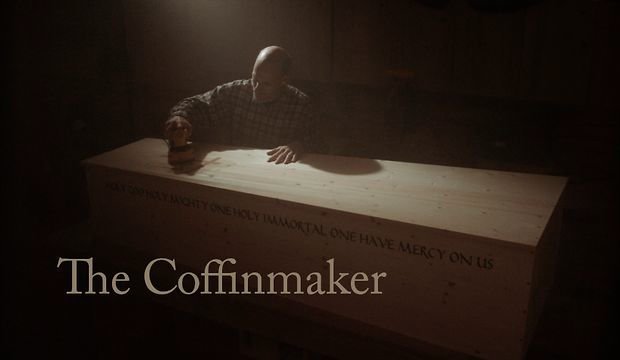The Coffinmaker of Vashon Island
Mar 23, 2015, 6:24 PM | Updated: Mar 24, 2015, 10:15 am

Marcus Daly was the subject of a short documentary film called "The Coffinmaker." (Photo courtesy of Dan McComb)
(Photo courtesy of Dan McComb)
Rain pours down on Vashon Island as Marcus Daly builds a simple, humble coffin from northwest pine in his backyard studio.
“I am putting the handles on the casket,” Daly said as he drills in a screw. “So this is kind of my favorite part because this is where people will be carrying the body of someone they love.”
Daly’s business, Marian Caskets, started in 2009, but the idea came several years before.
“I wanted to move out here to Vashon and start a little business building simple, wooden boats for people,” Daly said. “That didn’t pan out so we fell back on landscaping, which is something we’d done before.
“[After] Pope John II’s funeral, I saw that in 2005, he had this just incredibly beautiful, simple casket that really struck me, especially up against the backdrop of St. Peter’s Square and the magnificent architecture and art. It was just this very honest statement about ‘Naked we come into this world and naked we leave it.’ And I started to consider, why do we spend so much money and try to polish the reality of funerals and death so much? We do it even to our own disadvantage because it obscures a reality that is good for us. So I kind of carried that around in my heart for a few years.
“Then realized, you know, we were going to make simple, wooden vessels for people out here on Vashon. Perhaps we can make a different sort of simple, wooden vessel for a different sort of journey.”
So Daly makes coffins modeled after the one the Pope was laid in. Sometimes he hand carves names, dates or prayers into the wood.
“This one says on the side, ‘Holy God, holy mighty one, holy immortal one, have mercy on us.’ Then on the end it says, ‘Jesus I trust in you.’ A very short and simple prayer to help people hold on.”
The inside of each casket is lined with cotton and there’s a natural muslin mat and pillow.
“I fill the mat with straw. I figure, Jesus Christ came into this world on animal bedding, it’s a fitting thing for us to go out on.”
Daly doesn’t sell his coffins through a funeral home, he sells directly to people.
“I’ve had people come out and visit me when someone’s been diagnosed with a terminal illness because they wanted to look at my work and talk to me and tell me what they wanted me to do,” he said. “When you meet somebody in those circumstances they become pretty important to you pretty quickly, and so I tend to keep in touch with people and see how they’re doing.
“One man who was diagnosed with four months to live, he came out and told me what he wanted me to make for him. Four years later it’s still sitting on the shelf. I can’t sell my caskets with the promise it will extend your life by twelve times, but it’s also not a jinx, I guess, to think about it ahead of time.”
A father of seven, with a gentle demeanor, Daly has a hard time separating himself from his clients’ tragedies.
“I’m not good at that at all. Obviously, when children die that is an incredible cross for people to bear,” he said. “I have a hard time separating myself from that.”
But he thinks it’s good to face the reality that we’re all going to die. And building coffins with his own two hands has helped calm his fears of death.
“A very interesting thing I found with building coffins is that people don’t want to talk about death. I’ve given some talks at various places,” Daly said. “People say, ‘I wasn’t even going to come to this talk.’ The thing is, they don’t want to, but once they start they feel liberated and kind of relieved and glad to talk. I’ve had people say, ‘This is, like, the longest question and answer session we’ve ever had after a talk.’ It opens something that’s on all of our hearts, but that we’re not really facing.”
Daly gets orders from all around the country and makes one to two coffins a week. They take about 25 hours to build and cost less than half the price of an average casket.
“How do we show our love in this country? We tend to show it through spending money on people,” he said. “And really, just a simple act of love of supporting each other and helping each other through our burdens is much more efficacious than spending a bunch of money. So I think those traditions actually lead to a lot more healing.”













